5 science-backed reasons to stretch every day
If done right, a stretching routine can strengthen your mind and body.
Updated on December 16, 2022
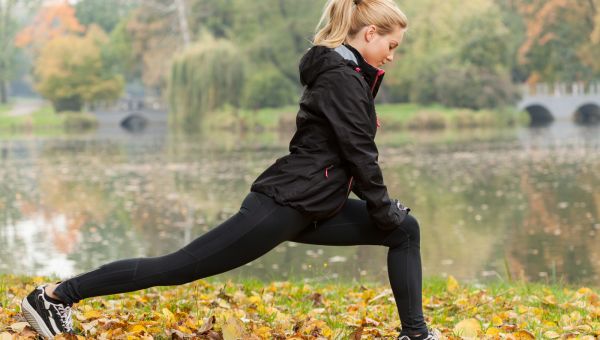
Regular stretching isn’t just for yogis or marathoners—it can benefit almost everyone. The habit could help you sleep, reduce the risk of injury, and much more.
Busy schedules can make it tough to add yet another task to your list, but all you need is a few minutes of daily stretching to get the advantages. “As long as you’re getting in a 10- to 15-minute stretch session per day, you’ll see the benefits stretching has to offer,” says certified athletic trainer Michael Payne of Doctors Hospital of Augusta in Georgia.
Here are five benefits of stretching, safety tips, plus easy ways you can incorporate this important habit into your life starting today.
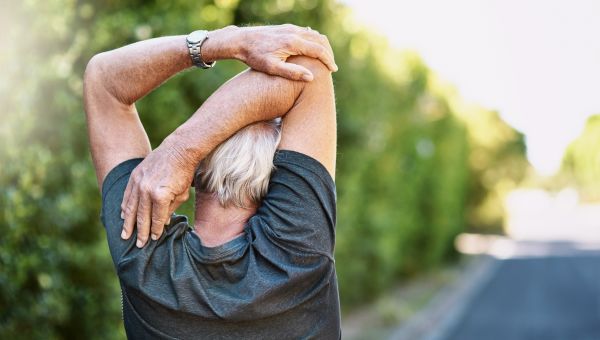
Stretching improves blood flow
Stretching helps increase blood flow which can help improve your energy levels. “During a stretch, your body senses the change in the muscle length and movement, and it prepares itself to become active by increasing blood flow. Increased blood flow throughout the body actually helps you feel more awake and alert,” says Payne. Researchers have also suggested that increased blood flow could offer some protection against heart disease, stroke, and diabetes since all of these conditions are associated with impaired blood flow.

Stretching increases mobility and range of motion
As you age, your muscles naturally begin to tighten, which can lead to limited or painful movement during normal day-to-day activities like reaching for a high shelf or bending over to pick up a heavy object, says Payne. Tight, shortened muscles are weaker, and that makes it difficult for them to perform as they’re supposed to. Tightened muscles may result in conditions like low back pain or sciatica, a pressure on the sciatic nerve that can cause pain, numbness, and burning sensations down the back of the thigh, lower leg, and foot.
Stretching regularly can loosen tight, weakened muscles so they can move more effectively.
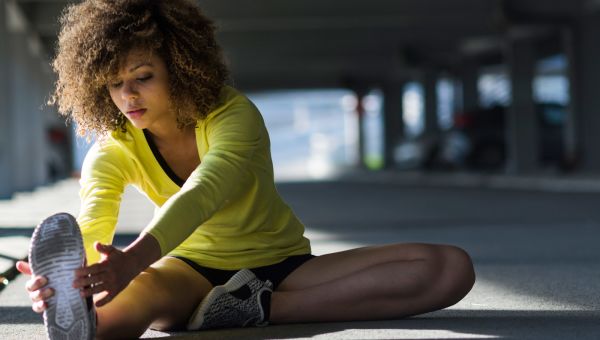
Stretching may boost your emotional health
Hectic days can cause stress and stress can lead to tense, tight muscles. “Stretching allows you to take a break from stressful activities, or to destress after a long day,” says Payne. You may experience additional benefits if you combine stretching with another relaxation practice, such as deep breathing.
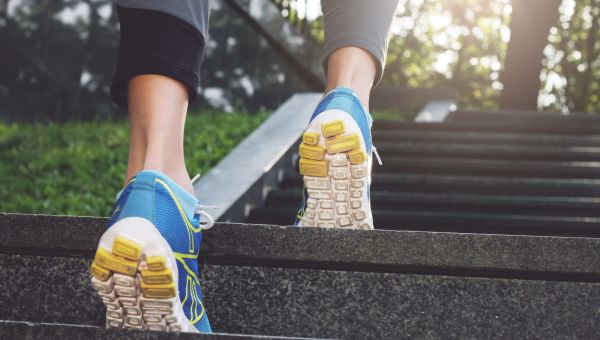
Stretching reduces injury risk
Regular stretching throughout the day increases your flexibility, and that can reduce the risk of injury in general. According to the American Council on Exercise, flexible muscles are less likely to become injured while moving around.
Since stretching also increases your joints’ range of motion, it may help decrease the resistance on your muscles during exercise. The types of workouts you’re doing and the types of aches and pains you have will determine the type of stretches that are most beneficial to you.
Stretching can be grouped into two categories: dynamic and static. Dynamic stretching involves movements that stretch your muscles and joints. Static stretching involves holding a pose for a certain period of time. If you’re planning to do vigorous exercise like running, stretching dynamically—with movements like high knees—can be helpful. “Dynamic stretching works on flexibility, range of motion and strength, while static stretching increases flexibility,” says Payne.
While dynamic stretches are typically used as part of an exercise warmup, static stretches are usually best done after a workout, when your body is warm.
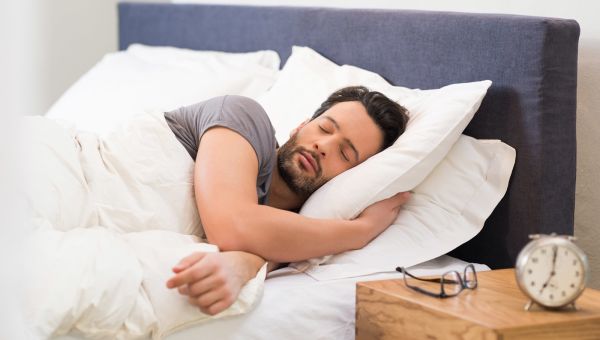
Stretching can help you get better sleep
A regular stretching routine may help you get better sleep at night by relieving tense muscles which may help alleviate stress. Deep breathing and long yoga stretches before bed can help calm your body and mind and encourage a good night’s rest.
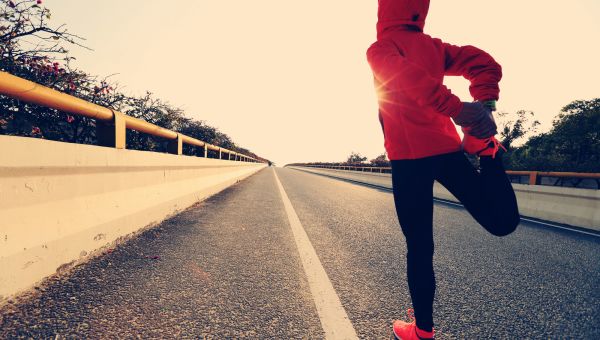
Commit to 15 minutes a day
Since it only takes 10 to 15 minutes a day to reap the benefits of stretching, you can get creative with the time and place you stretch. Plan out when you’re going to stretch the day before so you’re sure to set aside time for it.
One option is to make time during your lunch break for a quick walk followed by a stretch. “And stretching after your nightly shower or bath is a good way to destress after a long day,” says Payne.
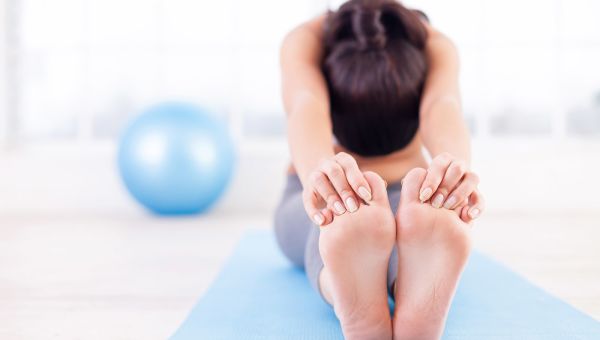
How to stretch correctly
To get the most out of stretching, practice proper technique. Start by making sure your body is warm and limber. Stretching aggressively right after rolling out of bed, for example, is not a great idea since your muscles will probably be tight.
Holding your stretches for about 30 seconds is the amount of time required to safely stretch out the muscle, says Payne. Avoid bouncing, which can cause pain or strain to the area. “As you bounce, you let go of the stretch and your muscle relaxes. When you go back down, you can stretch that muscle too much.”
Avoid holding your breath and relax. “Breathing helps muscles relax for a better stretch, and it will put you in a more relaxed state too,” says Payne. If you experience any pain, you’ve stretched it too far. Back off until it feels comfortable.

Warneke K, Konrad A, et al. Using Daily Stretching to Counteract Performance Decreases as a Result of Reduced Physical Activity-A Controlled Trial. Int J Environ Res Public Health. 2022 Nov 23;19(23):15571.
Miller T. Why stretching is more important than you think? The Ohio State University. Published August 10, 2017.
Harvard Health Publishing. Leg stretching may improve blood flow and prevent strokes. Published October 1, 2020.
Rijnberg FM, Hazekamp MG, et al. Energetics of blood flow in cardiovascular disease: Concept and clinical implications of adverse energetics in patients with a fontan circulation. Circulation. 2018;137(22):2393-2407.
Mayo Clinic. Stretching: Focus on flexibility. Published February 12, 2022.
Marcucci L, Reggiani C. Increase of resting muscle stiffness, a less considered component of age-related skeletal muscle impairment. Eur J Transl Myol. 2020;30(2):8982.
Do Y, Lall PS, Lee H. Assessing the effects of aging on muscle stiffness using shear wave elastography and myotonometer. Healthcare (Basel). 2021;9(12):1733.
Cleveland Clinic. Dealing with common aches and pains as we age with Dr. Donald Ford. Published November 21, 2018.
Penn Medicine. Sciatica. Last reviewed July 25, 2020.
Arizona Center on Aging. Range of motion in older adults. Accessed November 19, 2022.
HelpGuide.org. Relaxation Techniques for Stress Relief. Last updated December 5, 2022.
Kim SH, Schneider SM, et al. PTSD symptom reduction with mindfulness-based stretching and deep breathing exercise: randomized controlled clinical trial of efficacy. J Clin Endocrinol Metab. 2013 Jul;98(7):2984-92.
Columbine Health Systems Center for Healthy Aging. The simple act of stretching. Published June 23, 2021.
Timothy Miller, MD. Why stretching is more important than you think. The Ohio State University. October 20, 2017.
American Council on Exercise. Benefits of flexibility. Published April 21, 2022.
Mayo Clinic. Aerobic exercise: How to warm up and cool down. October 6, 2021.
MIT.edu. How to Stretch. Accessed December 15, 2022.
Arthritis Foundation. 7 Dynamic Warm-Ups. Accessed December 15, 2022.
Ribaudo A, Alva S. 10 stretches to do before bed to improve your sleep. Hospital for Special Surgery. Published January 19, 2021.
Bramble, L. Static vs. Dynamic Stretching: What are they and which should you do? Hospital for Special Surgery. Published April 19, 2021.
More On


video

article

slideshow


video


video
